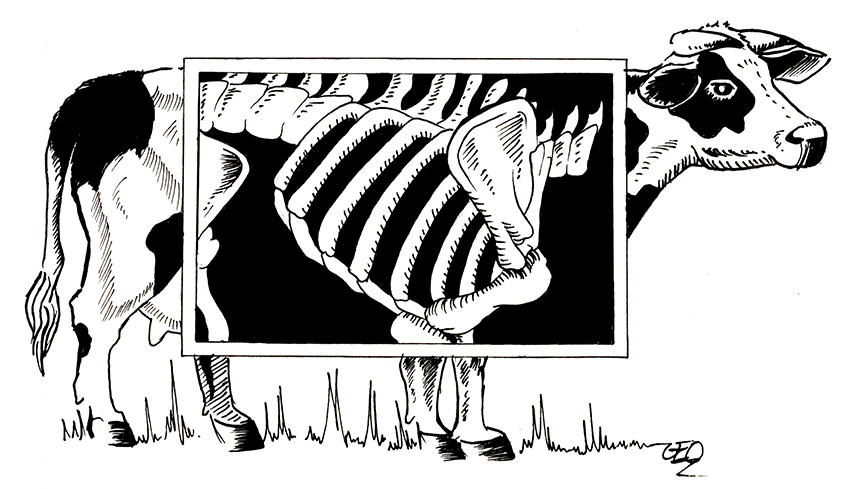As a kid, my grandmother insisted that I guzzle milk and snack on cheese and yogurt all day so that I have strong bones once I get as old as her. Was she right?
—Dairy Queen
There is some truth to Grandma’s fussing. Not to sound cheesy, but the calcium you consumed as a kid does play a part in your bone health once you get to be old and wise. You don’t necessarily have to eat meals solely comprised of milk, cheese and yogurt, but getting enough calcium is important for your diet.
Quick physiology lesson: Throughout your entire life, bone cells continually break down and rebuild in opposition to each other.
“During periods of growth you’re going to be putting on more bone than you’re taking off. During the aging process, after 40 or so, you’re going to start taking off more bone … so net effect, you lose bone,” said Lydia Steinman, a registered dietitian and distinguished senior lecturer in the Department of Nutritional Sciences.
Bone building is most crucial during adolescence — by the time girls are 18 and boys are 20, they have accrued up to 90 percent of peak bone mass, according to the Academy of Nutrition and Dietetics. Now you’re wishing you didn’t turn down that carton of milk in the lunch line.
“Once you reach adulthood, you don’t increase bone density, you maintain bone density. And when you get older, you try to minimize bone loss — because you’re going to have bone loss,” Steinman said.
There are ways to slow inevitable bone loss and therefore prevent osteoporosis — a condition of thin, brittle bones that causes many elderly individuals to easily fracture hips.
“I think one important thing is to exercise — weight-bearing exercise,” Steinman added.
Weight-bearing exercises — jogging, walking and tennis, for example — force your body to work against gravity.
“If the bones have to deal with the stressors of your exercise, then they’re going to be stronger in the long run,” Steinman said.
Although many vitamins and minerals obtained through the diet strengthen bones — potassium, magnesium, phosphorus and vitamin D, to name a few — calcium is one of the main bone-forming minerals. The skeleton stores 99 percent of the body’s calcium, according to Critical Reviews in Food Science and Nutrition.
Both men and women between the ages of 19 and 50 should try to consume 1,000 milligrams of calcium daily, according to the National Institute of Health. For reference, an 8-ounce glass of nonfat milk contains around 300 milligrams, and a cup of raw broccoli has about 40.
“Calcium is the major mineral in bones, and the most reliable source of calcium is dairy,” Steinman said.
Experts do not agree about exactly how much dairy you should consume. The 2015–2020 dietary guidelines recommend that individuals consume the equivalent of two to three cups of mostly fat-free or low-fat dairy products per day.
A cup of dairy is the equivalent of one and a half to two ounces of cheese. For those who don’t carry around a food scale in their back pocket, one ounce is the size of two dice — or in Austin terms, two tablespoons of queso.
The Harvard School of Public Health suggests that individuals limit dairy consumption to one to two servings a day. These researchers believe that milk may not be the best source of calcium for everyone. Dairy can be high in saturated fat and possibly increases the risk of ovarian cancer. Certain groups of individuals are prone to lactose intolerance — 90 percent of Asian-Americans, 70 percent of African-Americans and Native Americans and 50 percent of Hispanics.
“You can get calcium from other sources; you just have to be very conscientious about it,” Steinman said.
The lactose intolerant or vegan can enjoy almonds, leafy greens, broccoli and plant-based milks.
As college students, your maximum bone density is pretty much determined. But as long as you consume enough calcium and schedule in weight-bearing exercise to maintain it, you should have no reason to cry over spilled milk.















